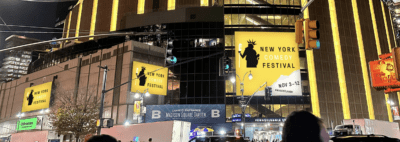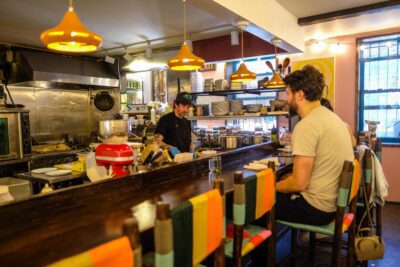Vanderbilt Avenue's Open Streets in action (Courtesy vanderbiltavenue.org)
Open Streets have been good for Brooklyn business, study shows
The car-free, fun-filled program is paying dividends along Fifth and Vanderbilt Avenues, according to the Dept. of Transportation
Open Streets, the pandemic-born program that shut down traffic along main routes in the city, has proven to be a boon for businesses on at least two major Brooklyn streets, in what is perhaps the least surprising news this month.
The results were revealed in a new study released by the Department of Transportation, which evaluated how shops and restaurants on car-free Vanderbilt Avenue in Prospect Heights and Fifth Avenue in Park Slope performed compared to streets with cars.
Businesses on the Open Streets in Prospect Heights saw their sales increase 20 percent compared to the pre-pandemic era and actually outperformed the borough’s average when compared to other Open Streets in Brooklyn. By comparison, Flatbush Avenue, which didn’t participate in the program, saw sales fall a shocking 40 percent.
Park Slope’s Open Streets were also successful and also outperformed the borough’s average. Sales on Fifth Avenue increased 26 percent, while the non-participating stretch of Seventh Avenue slid 17 percent compared to pre-pandemic times.
Not only did Open Streets contribute to existing business’ bottom lines, it also brought in new businesses compared to streets that weren’t open. Fifth Avenue experienced in increase of 18 percent in new restaurants and bars, compared to a 24 percent drop on nearby Seventh Avenue. Vanderbilt Avenue also registered similarly strong numbers of new businesses opening.
Bierwax owner Chris Maestro is quoted in the DOT report as saying that Open Streets was “single-handedly responsible” for saving his business. “I am fully confident to say that we would be closed now if Open Streets did not come to Vanderbilt Ave,” he said.
Similar sentiment was echoed by Bricolage owner Miro Gal in Park Slope.
“The significant added income resulting from the Open Streets program lifted Bricolage above the red line which enabled us to hire new staff, pay our bills and remain functioning,” he said. “It is totally clear to us that without Open Streets, Bricolage would have shut down its doors last year.”
Critics of the program have complained that Open Streets has drastically diminished the number of available parking spots in the borough and also contributed to an influx of rats and crowding.
You might also like 


























